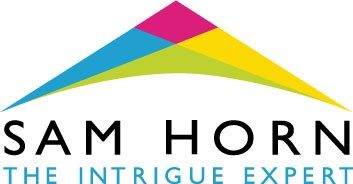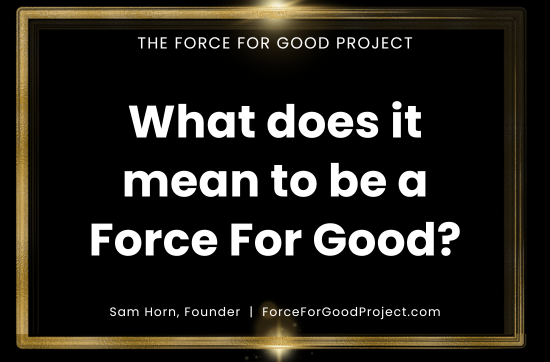“Being a Force For Good means making a positive difference for our self and others.”
– Sam Horn
I had a conversation with someone last week who’s going through a dark night of the soul. He works in Washington, D.C., and his entire job category just went away.
He’s been a passionate advocate for DEI – Diversity, Equity, and Inclusion – for decades. He has created an entire body of work around this topic and has written and spoken about how we can treat everyone (emphasis on everyone) with the respect they want, need, deserve.
So, as you can imagine, it’s been a body blow to be told his work is no longer relevant or needed. To be told this is a non-issue and everything he believes no longer matters.
First, I commiserated, then I shared a time I was going through a dark night of the soul in the hopes it might resonate with him, so he can reclaim his clarity on how he wants to show up.
I told him I’ll always be grateful to John Tullius (who cofounded the Maui Writers Conference with his wife Shannon) for sharing poet William Blake’s philosophy with me when I was in the midst of surreal circumstances that had knocked me to my emotional knees.
Here’s my distilled interpretation of Blake’s insight (which he introduced in his combined body of work Songs of Innocence and Experience, which was published in 1794.)
“We are all born innocent.
And at some point in our life, we encounter evil, hardships, corruption.
As a result of that experience, we either become jaded, cynical, and see the world as a dark place.
Or we become an INFORMED INNOCENT.
As an INFORMED INNOCENT, we are no longer naive or idealistic.
We know that evil, injustice, exploitation exists, we simply choose not to let it define or defeat us.
We choose to focus on – and align with – the best of humanity rather than the worst.
We choose to become a proactive force for good instead of a reactive force for harm.
We choose to believe in, embody, and be a source of love, joy, gratitude, positive agency.”
This OPTION (because that’s what it is) of being an “Informed Innocent” comforted me.
Because THIS I could control.
I couldn’t control what this person was doing or what was happening.
I could control choosing not to dwell on it and let it run and ruin my life.
I could control continuing to act in integrity – even when this person wasn’t.
I could control being a proactive force for good – instead of being a reactive force for harm.
To me, that meant doing what I could, on a daily basis, to make a positive difference for myself and others.
That choice to be an “Informed Innocent” became my saving grace, my moral North Star.
It became my personal and professional Ikigai (a Japanese word that means “purpose, reason for living.”) It helped me navigate those dark days, and it’s been a beacon ever since.
If I’m tempted to rant, rail, rage about something that’s happening, I ask:
- “Does focusing on this serve any good purpose?” (NO.)
- “Can I control what’s happening?”(NO.)
- “What CAN I control?” (My attention).
- “To what will I give my attention and agency?” (Something that makes a positive difference.)
Those four questions recenter me in who I choose to be and how I choose to show up.
They motivate me to focus on what I CAN control – and that’s to choose to connect with, collaborate with, and contribute to what’s right in the world.
By the way, being an Informed Innocent is just one of many ways we can be a Force for Good.
There are many others.
It can be as simple as truly listening to what someone’s saying so they feel seen, heard, valued.
It can be creating a company to solve a problem. Being the “hang-out” house in your neighborhood. Adopting a rescue animal. Tithing in tips. Teaching what you’re good at.
Those are just a few of the examples shared in my upcoming Force for Good Project book of how people are doing what they can to be a light in the dark.
How about you? Are you in the midst of dark days, tough times, challenging circumstances?
The question is, what are you going to do about it?
Ask yourself:
- Does focusing on what’s happening serve any good purpose?
- Can I control what’s happening?
- What can I control?
- What will I give my Time, Attention, Talents, Agency to?
As you probably already know, it serves no good purpose to dwell on evil and injustice, to go down the path of wrath, the rabbit hole of outrage.
And it serves no good purpose to become jaded, cynical, and see the world as a dark place.
The question is, how will you adopt a personal philosophy that re-centers you in who you want to be and how you want to show up?
How will you make a positive difference for yourself and others today – and every day?
This is what we can control.
And the good news is, you can do it, I can do it, we all can do it.
And it matters.
– – –
I’m interviewing people for my FORCE FOR GOOD PROJECT book. Get more information here on sharing your story – or nominating someone for our 2025 Force for Good Hall of Fame.

